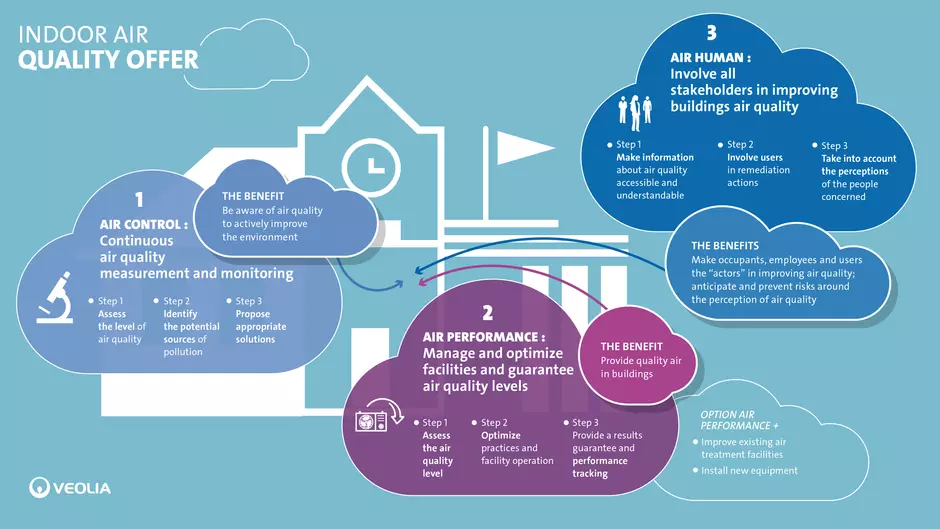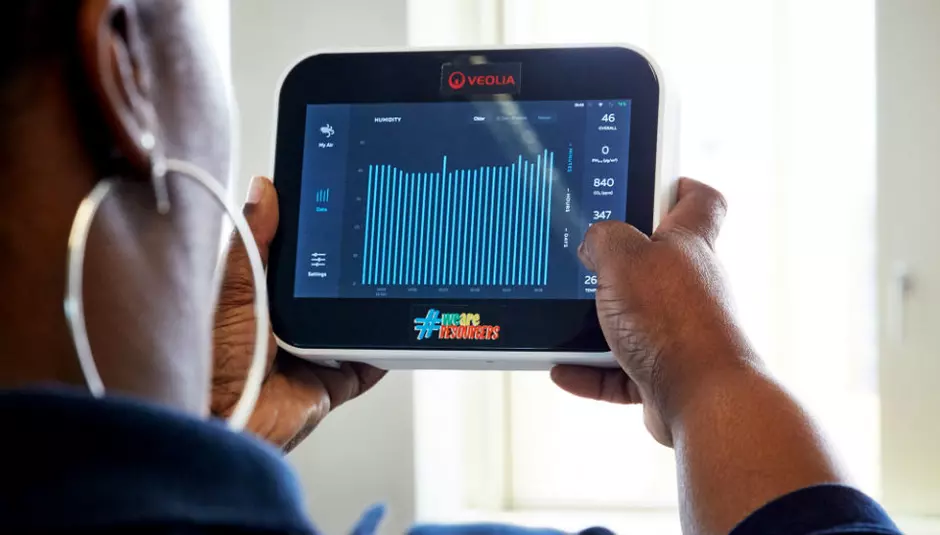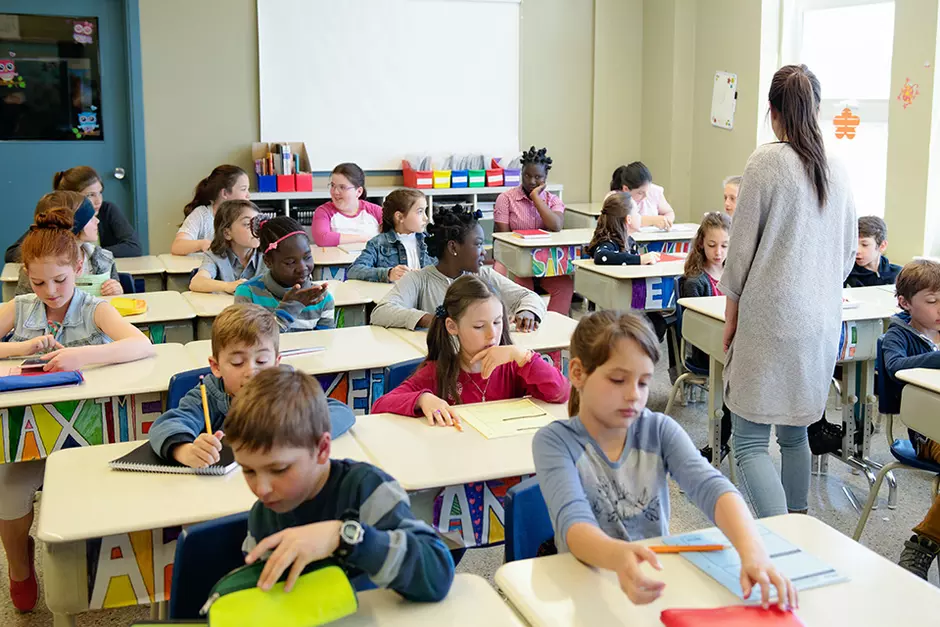On the occasion of its participation in the Smart City Expo World Congress in Barcelona, and as part of the launch of its new Hubgrade offer, Veolia is reaffirming its commitment to winning the battle for indoor air, a main environmental public health issue. While solutions do exist, the keys to taking action to guarantee healthy air lie in ambitious public policies, but also in making citizens and companies aware of the importance of dealing with this invisible pollution.
Air quality, a public health issue and a global imperative
A genuine public health issue, air pollution is one of the main environmental risks worldwide. According to the World Health Organization (WHO), it’s been responsible for over 8 million premature deaths in 2016, making it the fourth leading risk factor for mortality worldwide. By 2060, these figures could rise to as many as 9 million annual deaths, with serious economic consequences.
A 2019 study by Elabe for Veolia, conducted in France, Belgium and the Shanghai metropolitan area, highlighted an alarming awareness: more than one in two French people, and over 60% of Belgians and Shanghainese, were surprised to learn that we are more exposed to indoor air pollution in our homes and the buildings we frequent than to outdoor air pollution. Although little-known by the general public, indoor air is what we breathe over 80% of the time.
Veolia's expertise at your service
As a world leader, Veolia is committed to playing a central role in improving indoor air quality. Breathing clean air is a universal right, and the Group is doing everything it can to make this vision a reality. Since 2019, the Group has created a specific offer to provide long-term support for its customers and offer them a guarantee of good air quality.
What is air pollution?
Air pollution is the presence of chemical, physical or biological agents that alter the natural characteristics of the atmosphere, whether indoors or outdoors.
Air quality and pollutants in the air explained by VERSO
Veolia has developed a fully-integrated offer for improving air quality, with three building blocks to suit different needs:
- Air control: continuous assessment and monitoring of air quality
- Air performance: manage installations and guarantee air quality levels
- Air human: involve stakeholders in improving air quality.

To find all the information about our offer: Improving indoor air quality
In 2020, Veolia teams audited indoor air quality at Norman Manley International Airport (NMIA) in Kingston, Jamaica, the country's main airport for business travel and air freight.

More details to read on Indoor air quality: OFIS commissioned by Kingston Airport.
Veolia and the Raincy school, in France, initiated a project to optimize the quality of the indoor air breathed by schoolchildren.

Find out all about air pollution in the Raincy school.
Discover our video “En Route: How to combat air pollution?”
Involving all stakeholders
Involving stakeholders in improving air quality is essential. It fosters a collective, multi-dimensional approach that is essential to meeting the complex challenges of indoor air quality.
Indoor air quality in buildings must be considered from design to operation, and all players, including building occupants, must contribute.
Stakeholders (occupants, managers, owners, service providers, etc.) complement technical solutions by helping to eliminate or reduce behaviors that have a negative impact on indoor air quality. Raising awareness and educating people about indoor air quality issues also helps to ensure that the good practices implemented in the workplace are then reproduced in the private sphere, particularly in the home.

A word from Maria Vittoria Pisante, Director of strategy, communication and business development for Veolia in Italy.
What are the challenges of indoor air quality?
Maria Vittoria Pisante : "There's a real public health rationale to acting on indoor air quality pollution. We spend over 80% of our time indoors, so we are directly affected by the quality of the air we breathe and the pollution it may contain. The air we breathe comes from outside, but it is also affected by the pollutants present in buildings (construction materials, furniture, occupants’ behavior, etc.). But unlike outside air, there are solutions to improve it quickly, efficiently and sustainably. That's why we've decided to tackle this invisible pollution to achieve lasting improvements in the quality of the indoor air you breathe. Finally, there's the issue of energy efficiency, to which we are fully committed at Veolia. Indeed, it is possible to optimize energy consumption through intelligent air quality management. Let's take the example of offices and telecommuting: we need to take into account the actual presence of employees on site, in order to control ventilation of workspaces as closely as possible, depending on how busy they are. The need for air renewal on a Friday afternoon will not be the same as on a Tuesday morning."
In concrete terms, how does Siram @ Veolia deal with this pollution?
MV Pisante : "Siram puts all its expertise into improving air quality, notably through the development of innovations, which we make available to our customers and our own teams at Group-operated facilities. In simple terms, air is taken from outside the building, filtered and purified, then circulated into the various rooms where people breathe. To do this, we first need to identify the existing pollution levels in and around the building. This is why we deploy our Hubgrade Indoor Air service, with continuous monitoring of indoor air quality. Then, depending on the situation, we adapt the air-handling systems and the volumes of air to be circulated in, to guarantee high-quality air and optimise energy consumption.”
What makes Siram @Veolia different?
"Siram's expertise in energy efficiency enables us to combine quality air with optimized energy consumption. This is essential if we are to avoid unnecessary expenditure and a degraded carbon footprint. We implement these solutions on the installations we manage to ensure that the air breathed in our customers' buildings is of good quality in all circumstances.
Since 2021 Siram Veolia has installed remotely controlled indoor air quality monitoring in the Museum of Varese's Municipality and in in the Valle D'Aosta Region's Palace. In addition to monitoring environmental parameters, Siram carries out a biannual report on the state of health of the air, also improving it by installing an innovative panel that incorporate a smog-absorbing, bactericidal and energy-free technology."


